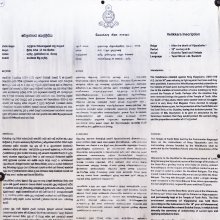Katika, Katikā, Kaṭikā: 12 definitions
Introduction:
Katika means something in Hinduism, Sanskrit, Buddhism, Pali, the history of ancient India, Hindi. If you want to know the exact meaning, history, etymology or English translation of this term then check out the descriptions on this page. Add your comment or reference to a book if you want to contribute to this summary article.
Images (photo gallery)
In Hinduism
Purana and Itihasa (epic history)
Source: JatLand: List of Mahabharata people and placesKatika (कतिक) is a name mentioned in the Mahābhārata (cf. IX.44.62) and represents one of the many proper names used for people and places. Note: The Mahābhārata (mentioning Katika) is a Sanskrit epic poem consisting of 100,000 ślokas (metrical verses) and is over 2000 years old.

The Purana (पुराण, purāṇas) refers to Sanskrit literature preserving ancient India’s vast cultural history, including historical legends, religious ceremonies, various arts and sciences. The eighteen mahapuranas total over 400,000 shlokas (metrical couplets) and date to at least several centuries BCE.
India history and geography
Source: Project Gutenberg: Castes and Tribes of Southern India, Volume 1Katika (“collyrium”) is one of the exogamous septs (divisions) among the Malas (considered the Pariahs of the Telugu country) of the Reddi Bhumi section. The Mala people are almost equally inferior in position to the Madigas and have, in their various sub-divisions, many exogamous septs (e.g., Katika).

The history of India traces the identification of countries, villages, towns and other regions of India, as well as mythology, zoology, royal dynasties, rulers, tribes, local festivities and traditions and regional languages. Ancient India enjoyed religious freedom and encourages the path of Dharma, a concept common to Buddhism, Hinduism, and Jainism.
Languages of India and abroad
Pali-English dictionary
Source: BuddhaSasana: Concise Pali-English Dictionarykatikā : (f.) talk; conversation; an agreement.
Source: Sutta: The Pali Text Society's Pali-English DictionaryKatikā, (f.) (to katheti or karoti?) 1. agreement, contract, pact Vin. I, 153 (T. kātikā), 309; J. VI, 71; Miln. 171, 360.—2. talking, conversation, talk (adhammikā k. , cp. kathikā & kathā) J. II, 449.—katikaṃ karoti to make an arrangement or agreement Vin. III, 104, 220, 230; J. I. 81; IV, 267; DhA. I, 91; VvA. 46. In cpds. katika°, e.g. °vatta observance of an agreement, °ṃ karoti to be faithful to a pact Dh. I, 8; °ṃ bhindati to break an agreement J. VI, 541; °saṇṭhāna the entering of an agreement Vin. II, 76, 208: III, 160. (Page 182)

Pali is the language of the Tipiṭaka, which is the sacred canon of Theravāda Buddhism and contains much of the Buddha’s speech. Closeley related to Sanskrit, both languages are used interchangeably between religions.
Sanskrit dictionary
Source: DDSA: The practical Sanskrit-English dictionaryKaṭikā (कटिका).—The hip; गुह्यं तु फाल्गुनी विद्यात्कृत्तिका कटिकास्तथा (guhyaṃ tu phālgunī vidyātkṛttikā kaṭikāstathā) Mahābhārata (Bombay) 13.11.4.
Source: Cologne Digital Sanskrit Dictionaries: Edgerton Buddhist Hybrid Sanskrit DictionaryKaṭikā (कटिका).—chip, piece of wood (as record): Mūla-Sarvāstivāda-Vinaya i.4.9 ff. (= Tibetan thur ma, = śalākā, Dutt).
Source: Cologne Digital Sanskrit Dictionaries: Benfey Sanskrit-English DictionaryKaṭikā (कटिका).—[kaṭi + kā], f. The hip, Mahābhārata 13, 5390.
Source: Cologne Digital Sanskrit Dictionaries: Monier-Williams Sanskrit-English Dictionary1) Kaṭikā (कटिका):—[from kaṭaka > kaṭ] a f. a straw mat [commentator or commentary] on [Kātyāyana-śrauta-sūtra]
2) Kaṭika (कटिक):—[from kaṭ] mfn. ifc. = haṭi, the hip, [Suśruta]
3) Kaṭikā (कटिका):—[from kaṭika > kaṭ] b f. the hip, [Mahābhārata]
4) Kaṭīka (कटीक):—[from kaṭ] ifc. = kaṭī above.
5) Katika (कतिक):—[from katama] 1. katika mfn. (for 2. See below) how many? [Caraka]
6) [v.s. ...] bought for how much? [Patañjali]
7) [from kati] 2. katika (for 1. See above) n. Name of a town, [Rājataraṅgiṇī]
[Sanskrit to German]
Sanskrit, also spelled संस्कृतम् (saṃskṛtam), is an ancient language of India commonly seen as the grandmother of the Indo-European language family (even English!). Closely allied with Prakrit and Pali, Sanskrit is more exhaustive in both grammar and terms and has the most extensive collection of literature in the world, greatly surpassing its sister-languages Greek and Latin.
Hindi dictionary
Source: DDSA: A practical Hindi-English dictionaryKātika (कातिक):—(nm) the eighth month of the Hindu calendar; also [kārtika].
...
Kannada-English dictionary
Source: Alar: Kannada-English corpusKaṭika (ಕಟಿಕ):—[noun] = ಕಟಿಗ [katiga].
Kannada is a Dravidian language (as opposed to the Indo-European language family) mainly spoken in the southwestern region of India.
See also (Relevant definitions)
Starts with (+1): Katikacuttiram, Katikai, Katikaikkol, Katikaimarayan, Katikaimattiyastan, Katikaivenpa, Katikaiyar, Katikal, Katikala, Katikam, Katikamonga, Katikantu, Katikapala, Katikaram, Katikaraviciri, Katikaropi, Katikarpata, Katikasnanam, Katikataruna, Katikati.
Ends with (+54): Apakatika, Avakatika, Candrikatika, Chandodipikatika, Cikitsakalikatika, Cinakarkatika, Cukatika, Dattakacandikatika, Dipikatika, Dodhakashlokatika, Dodhakashokatika, Gaushakatika, Gopakarkatika, Gorakshashatakatika, Gramashakatika, Hastamalakatika, Hathapradipikatika, Hathapradipikatika, Hathapradipikatika, Jatakacandrikatika.
Full-text: Katikacuttiram, Katikasnanam, Katikataruna, Karttika, Naikatika, Kartik, Avakatika, Avakutarika, Katikam, Kathika, Kataka, Taruna.
Relevant text
Search found 5 books and stories containing Katika, Katikā, Kaṭikā, Kaṭika, Kaṭīka, Kātika; (plurals include: Katikas, Katikās, Kaṭikās, Kaṭikas, Kaṭīkas, Kātikas). You can also click to the full overview containing English textual excerpts. Below are direct links for the most relevant articles:
Sushruta Samhita, volume 3: Sharirasthana (by Kaviraj Kunja Lal Bhishagratna)
Chapter VI - The Marmas (vital parts of the body)
List of Mahabharata tribes (by Laxman Burdak)
List of Mahabharata people and places (by Laxman Burdak)
Vinaya (3): The Cullavagga (by T. W. Rhys Davids)
Cullavagga, Khandaka 4, Chapter 4 < [Khandaka 4 - The Settlement of Disputes among the Fraternity]
The Religion and Philosophy of Tevaram (Thevaram) (by M. A. Dorai Rangaswamy)
Chapter 5 - Universalism < [Volume 4.1.2 - The conception of Paramanaiye Paduvar]
